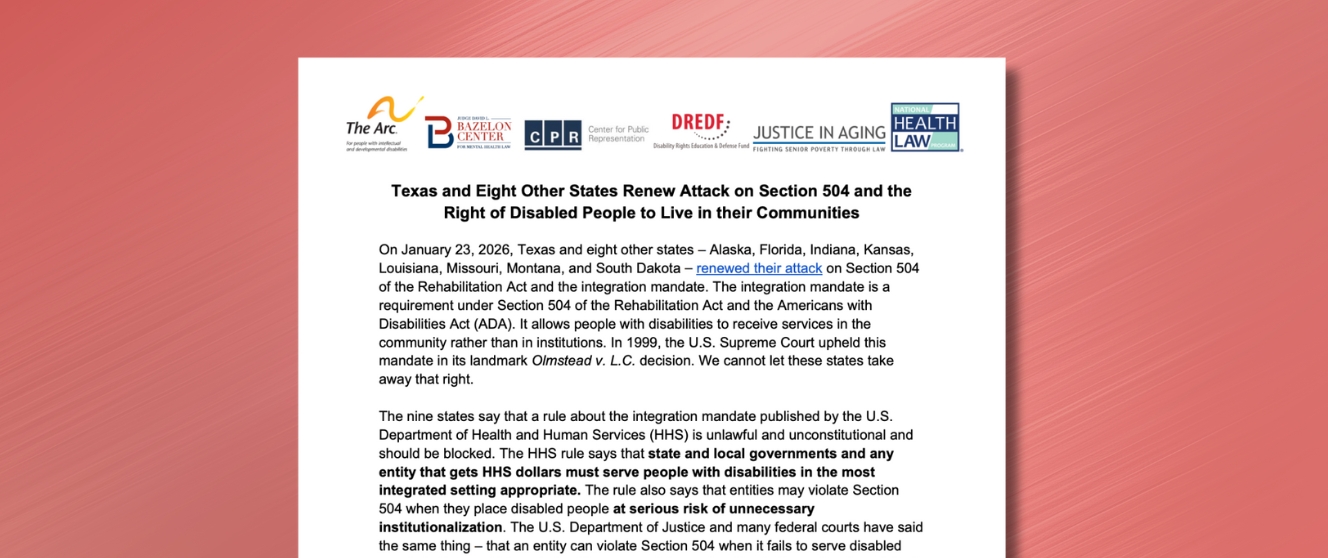
April 6, 2018
Via Electronic Delivery
Honorable Jim Wood
Chair, Health Committee
California State Assembly
Capitol Building, Room 6005
Sacramento, CA 95814
RE: AB 1971 (SANTIAGO) and AB 2156 (CHEN) – OPPOSE
Dear Assembly Member Wood:
Disability Rights Education and Defense Fund (DREDF) is a national cross-disability law and policy center that protects and advances the civil and human rights of people with disabilities through legal advocacy, training, education, and development of legislation and public policy. Based in Berkeley, we are committed to state and national policies that will increase accessible and equally effective healthcare for people with disabilities and eliminate persistent health disparities that affect the length and quality of their lives.
Given our organizational mission, DREDF strongly favors increasing community-based mental health services and supports, as well as transitional and permanent affordable housing, to homeless individuals and persons with disabilities. Unfortunately, we must oppose AB 1971 and AB 2157, which are scheduled to be heard in the Assembly Health Committee on April 10, 2018. Given the benefit of the doubt, and trusting in the good intentions of Assemblymembers Santiago and Chen who respectively authored the bills, both proposals appear to have a final goal of ensuring that people with significant disabilities receive needed food, clothing, shelter, and medical treatment. Unfortunately, both bills choose to basically expand county conservatorship as the means to achieve its goal. DREDF strongly disfavors the needless expansion of conservatorship, which broadly allows a conservator to manage the financial affairs and daily life of a conserved person. Those who are conserved are left with limited legal capacity, inevitably lose personal choice in many facets of their lives, and face institutionalization against their will for some period of time.
Furthermore, neither bill clearly provides or gives evidence to support a factual need for such an expansion. Nor do the bills logically connect how expanding conservatorship beyond what is already available in the existing Lanterman-Petris-Short Act (LPS) will lead to more efficacious, efficient or sustainable means of supporting people with disabilities to move away from homelessness and toward greater health and financial stability. As the excellent letter submitted April 2 by our colleagues at Disability Rights California (DRC) and other advocacy organizations highlight, neither bill seems to call for augmentation of existing local resources and supports for providing food, clothing, housing, or community-based healthcare, mental health treatment and behavioral supports for homeless persons with disabilities. Since such local resources are already strained in many counties in California, it is difficult to see how the mere expansion of who can be conserved and how, will lead to these individuals having greater access to significant, evidence-based community services and supports.
Rather than reiterate the substance of DRC’s letter opposing these bills, DREDF would like to add only the following information concerning the Convention on the Rights of Persons with Disabilities (CRPD), an international treaty that was adopted by the United Nations (UN) in December 2006. The CRPD is considered the first comprehensive human rights treaty of the 21st Century and had a record number of signatories when it was first opened for ratification on March 2007. By May 2008, the CRPD received sufficient international ratification to enter into force, and currently has 177 ratifications.
The CRPD is also notable for being a treaty that was truly shaped and written by persons with various disabilities, representing many different member countries. It was hammered out over a period of several years through in-person meetings where international Disabled Persons Organizations, representatives of member states, and people with disabilities within those member states all met together as equals. The general principles of the CRPD are given in Article 3. The first principle given is “Respect for inherent dignity, individual autonomy including the freedom to make one’s own choices, and independence of persons.” Two provisions that appear under Article 12 on Equal Recognition before the Law are “States Parties shall recognize that persons with disabilities enjoy legal capacity on an equal basis with others in all aspects of life” and “States Parties shall take appropriate measures to provide access by persons with disabilities to the support they may require in exercising their legal capacity.”
The United States has signed, but not ratified the CRPD. As such, our country is neither bound by the treaty nor an authoritative voice on the CRPD’s provisions. On the other hand, the US has been acknowledged internationally as a leader on disability rights with the passage of Section 504 of the Rehabilitation Act of 1973 (Section 504), subsequent ground-breaking Section 504 regulations enacted by federal agencies later in that decade, and the passage of the Americans with Disabilities Act of 1990 (ADA). Moreover, the US Supreme Court’s 1999 decision in Olmstead v. L.C., 527 U.S. 581, firmly established that people with disabilities have a right to receive needed healthcare and services without segregation.
The link between the ideals expressed in the CRPD and our own Section 504 and ADA, and the expansion of the definition of “gravely disabled” that is sought in AB 1971 and AB 2156 may initially seem unclear, given that the former deal with human and civil rights, while the latter focus on welfare and public health. DREDF believes the connections are very clear, however, since it is in the area of health that people with disabilities are most prone to be treated according to their diagnoses, and not according to their capacity and dignity as human beings. Institutionalization, conservatorship, and guardianship should always be the tools of last resort because of the tremendous and lasting impact that they have on the persons with disabilities to whom they are applied. Ultimately, no matter the stated or unstated aspirations of these bills, neither establishes a genuine and urgent need for expanding the ability of counties to conserve individuals with disabilities. At a time when all over the world, countries have been catalyzed by the CRPD and other international developments to work toward deinstitutionalization, supporting the legal capacity of citizens with disabilities, and finding better ways to deliver needed healthcare, mental health treatment, and behavioral supports to people with disabilities, there is no reason for California at this time to work backwards and expand conservatorship.
Thank you for the opportunity to write in our opposition. Please feel free to contact me with any questions or concerns with the above.
Sincerely,

Silvia Yee
Senior Staff Attorney
CC: Honorable Members, Assembly Health Committee
Paula Villescaz, Principal Consultant, Assembly Health Committee
Honorable Miguel Santiago, California State Assembly
Marilyn Limon, Legislative Aide, Office of Assembly Member Santiago
Honorable Phillip Chen, California State Assembly
Lauren Aguilar, Legislative Director, Office of Assembly Member Chen
Donna Seitz, Chief Legislative Representative, County of Los Angeles
Kelly Brooks-Lindsey, Partner, Hurst Brooks Espinosa, LLC
Randall Hagar, Director of Government Relations, California Psychiatric Association
Adriana Ruelas, Steinberg Institute

